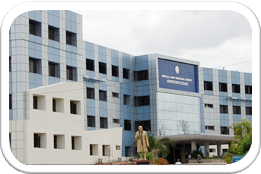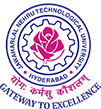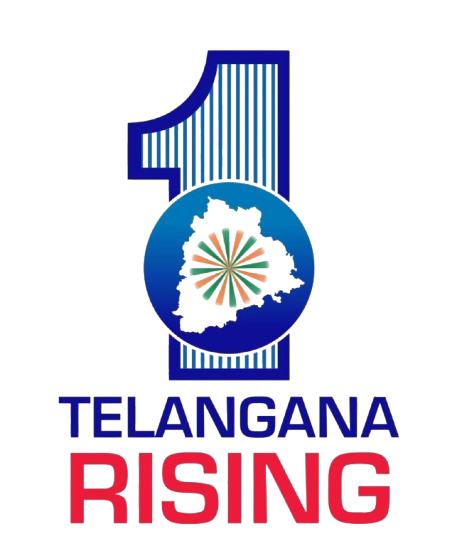About JNTUH
Established in 1965 as Nagarjuna Sagar Engineering College, JNTUH underwent a significant evolution before becoming the esteemed institution it is today. Originally conceived as a college, it later transformed into a full-fledged Technological University in 1972, earning recognition as Jawaharlal Nehru Technological University, paying homage to India's first Prime Minister. Nestled in the vibrant city of Hyderabad, its sprawling main campus in Kukatpally stands as a testament to its commitment to excellence. . |
 |
Over time, Jawaharlal Nehru Technological University Hyderabad (JNTUH) has established itself as a pivotal institution in the realms of technological education and research, extending its influence not only within Telangana but throughout India. Its significant contributions span across various fields including engineering, science, pharmaceutical sciences, Computer Applications and Management studies. Through pioneering research and innovative initiatives, JNTUH has played a crucial role in shaping its own landscape as well as influencing the broader educational sphere both regionally and nationally. |
|
In 1995, a pivotal moment reshaped the trajectory of the university as it gained affiliating status from the state government, marking a significant milestone in its evolution. Since then, the university has flourished, emerging as one of the most expansive affiliating institutions in the region. Its influence has spread widely, encompassing private colleges across Andhra Pradesh. By serving as an affiliating body, the university has nurtured a dynamic academic environment, facilitating access to quality education and promoting excellence across various disciplines within the state. |
|
However, in 2008, the university underwent a notable transformation after 37 years of dedicated service. This restructuring resulted in the establishment of four distinct entities: JNTU Hyderabad, JNTU Anantapur, JNTU Kakinada, and JNAFAU, Hyderabad. The restructuring was formalized through Government Order No. 13 in August 2008 and subsequent State Legislature Act No. 30 in September 2008. As a result, the institution was renamed Jawaharlal Nehru Technological University Hyderabad (JNTUH), preserving its heritage while embracing an expanded role. |
|
JNTUH's jurisdiction now covers the entirety of the Telangana region, reflecting its dedication to meeting the educational needs of the state. This commitment remained steadfast amid significant geopolitical changes, including the establishment of Telangana as a separate state in June 2014. JNTUH seamlessly transitioned into its role as the State Affiliating University of Telangana State. Through these transformations, JNTUH has persisted in its mission to promote academic excellence, research advancement, and technological innovation, leaving an enduring impact on India's educational landscape. |
|
JNTUH has consistently proven its commitment to excellence in education and academic standards. Recognizing this dedication, the National Assessment and Accreditation Council (NAAC) has awarded JNTUH with an 'A' Grade for two consecutive assessment cycles. This prestigious accreditation underscores the institution's continuous efforts towards quality education and institutional development. In a remarkable achievement, JNTUH has further elevated its standing in 2024 by obtaining an 'A+' Grade accreditation from NAAC. This coveted recognition reflects the university's unwavering pursuit of academic brilliance and overall institutional advancement. Notably, JNTUH has achieved this remarkable feat with a commendable Cumulative Grade Point Average (CGPA) of 3.32, reaffirming its status as a beacon of educational excellence. |
|
As of today, Jawaharlal Nehru Technological University Hyderabad (JNTUH) boasts an extensive academic infrastructure, comprising 8 University constituent colleges, 16Directorates, and 6 centres of excellence. This comprehensive setup reflects the university's commitment to providing diverse educational opportunities and fostering interdisciplinary research. Situated in Hyderabad, the main campus of JNTUH is home to prominent institutions such as the University College of Engineering Science and Technology (UCEST), an autonomous college renowned for its Engineering, Science and Technology programmes. The main campus also houses the college of Business Administration, which offers specialized education in Business administration and Management discipline. This array of Institutions within the main campus underscores JNTUH approach towards academic excellence, catering to a broad spectrum of educational interests and career aspirations. Through its varied colleges and departments, JNTUH continues to play a pivotal role in shaping the future of numerous students and contributing significantly to the advancements of knowledge and innovation in various fields. |
|
University Colleges and Academic Units: There are eight University Colleges and four academic units under the university, namely,
|
|
The University Engineering/Pharmacy Colleges and Academic Units of JNTUH are offering B.Tech. in 32 branches, B.Pharmacy, M.Tech. in 39 specializations, M.Pharmacy in 10 specializations, M.Sc. in 8 specializations, MBA and MCA, and Five-year Integrated Dual Degree Masters Program in 5 specializations with M.Tech. Additionally, MS and Ph.D. programs in various disciplines of Engineering, Technology, Science, Management and Humanities & Social Sciences are offered. The University has Memoranda of Understanding (MoU) with many International and National Organizations/Universities/Institutions. Administrative and other units:
Centres of Excellence:
|
|





